Share

The Ancients
The Death of Alexander the Great: Explained
Alexander the Great’s untimely death at Babylon in 323 BC triggered an unprecedented crisis across his continent-spanning empire.
Within a couple of days, the very chamber in which he died witnessed a gore-soaked showdown between his previously united commanders and soldiers. Within a fortnight, Babylon saw the first siege of the post-Alexander age.
In this special explainer episode to mark the anniversary of Alexander’s death, Tristan brings to life the imperial implosion that was the immediate aftermath of the Macedonian king's death - a subject he knows one or two things about, seeing as he’s written a book on it!
Tristan’s book The Perdiccas Years, 323-320 BC (Alexander's Successors at War) is available on Amazon here.
This episode was produced by Elena Guthrie and mixed by Aidan Lonergan. It contains translations of contemporary speeches by JC Yardsley & music from Epidemic Sound.
For more Ancients content, subscribe to our Ancients newsletter here.
If you'd like to learn more, we have hundreds of history documentaries, ad free podcasts and audiobooks at History Hit - subscribe today!
Come see us at Chalke Valley
Further Reading - Primary Sources
Arrian Events After Alexander 1.1–1.9A.
Curtius 10.5–10.10.
Diodorus Siculus 18.1–18.6.
Justin 13.1–13.4.
Plutarch Life of Eumenes 3.
Secondary Sources
Anson, E. (1992), ‘Craterus and the Prostasia’, Classical Philology 87 (1), 38–43.
Anson, E. (2015), Eumenes of Cardia, Leiden, 58–77.
Bosworth, A. B. (2002), The Legacy of Alexander: Politics, Warfare, and Propaganda under the Successors, New York, 29–63.
Errington, R. M. (1970), ‘From Babylon to Triparadeisos: 323–320 bc’, The Journal of Hellenic Studies 90, 49–59.
Meeus, A. (2008), ‘The Power Struggle of the Diadochoi in Babylon, 323bc’, Ancient Society 38, 39–82.
Meeus, A. (2009), ‘Some Institutional Problems concerning the Succession to Alexander the Great: “Prostasia” and Chiliarchy’, Historia 58 (3), 287–310.
Mitchell, L. (2007), ‘Born to Rule? Succession in the Argead Royal House’, in W. Heckel., L. Tritle and P. Wheatley (eds.), Alexander’s Empire: Formulation to Decay, California, 61–74.
Worthington, I. (2016), Ptolemy I: King and Pharaoh of Egypt, New York, 71–86
More episodes
View all episodes
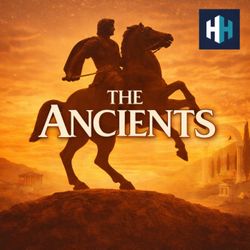
635. The Road to Babylon | Alexander the Great
01:13:44||Ep. 635Tristan Hughes and Dr Adrian Goldsworthy continue the special series on Alexander the Great, delving into the epic sieges of Tyre and Gaza in 332 BC, and Alexander's triumphant campaign through Egypt. They explore the strategic brilliance at the Battle of Gaugamela, the fall of Persepolis, and the eventual demise of Darius III. As Alexander's army pushes further east, tackling internal conspiracies and relentless combat, they traverse the formidable landscapes of Bactria and Afghanistan, capturing Alexander's the blend of military genius, relentless ambition, and the complex legacy of one of history's most formidable commanders.MOREThe Ancient AmazonListen on AppleListen on SpotifyThe Walls of BabylonListen on AppleListen on SpotifyPresented by Tristan Hughes. Audio editor is Aidan Lonergan, the producer is Joseph Knight. The senior producer is Anne-Marie Luff.All music courtesy of Epidemic SoundsThe Ancients is a History Hit podcast.Sign up to History Hit for hundreds of hours of original documentaries, with a new release every week. Sign up at https://www.historyhit.com/subscribe. You can take part in our listener survey here: https://insights.historyhit.com/history-hit-podcast-always-on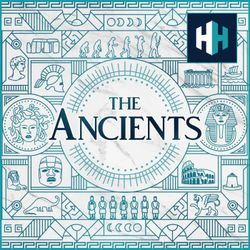
634. The Skulls of Jericho
53:53||Ep. 634In the depths of ancient Jericho, beneath layers of earth dating back 10,000 years, archaeologists uncovered something extraordinary: human skulls cast in plaster, their faces carefully reconstructed and their eyes set with shells. Who were these haunting figures meant to represent?In this episode of The Ancients, Tristan Hughes is joined by archaeologist Raven Todd DaSilva to explore the mysterious plastered skulls of Jericho. Dating to the Neolithic period, these striking objects reveal complex beliefs about memory, identity and the dead in some of the world’s earliest farming communities. How were they made? What did they mean? And why did this unusual practice spread across the Levant? Join us to dive into one of prehistory’s most compelling archaeological discoveries.MOREJericho:Listen on AppleListen on Spotify Origins of the Inuit:Listen on AppleListen on Spotify Watch this episode on our YouTube channel: @TheAncientsPodcastPresented by Tristan Hughes. Audio editor is Aidan Lonergan. The producer is Joseph Knight. The senior producer is Anne-Marie Luff.All music courtesy of Epidemic SoundsThe Ancients is a History Hit podcast.Sign up to History Hit for hundreds of hours of original documentaries, with a new release every week. Sign up at https://www.historyhit.com/subscribe. You can take part in our listener survey here:https://insights.historyhit.com/history-hit-podcast-always-on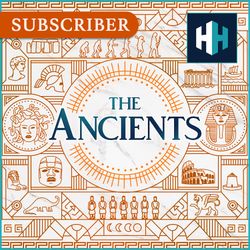
633. After Ancients: Sir Barry Cunliffe
31:45||Ep. 633In this special subscriber episode, we have an exclusive interview with the renowned archaeologist, Sir Barry Cunliffe.Barry shares insights from his extraordinary 50-year career, detailing his early days, notable excavations, including at Fishborne Roman Palace, where a last-minute dig unearthed a significant mosaic, and the challenging excavation of the sacred, but deadly, spring in Bath.Presented by Tristan Hughes. Audio editor is Aidan Lonergan. The producer is Joseph Knight. The senior producer is Anne-Marie Luff.All music courtesy of Epidemic SoundsThe Ancients is a History Hit podcast.Sign up to History Hit for hundreds of hours of original documentaries, with a new release every week. Sign up at https://www.historyhit.com/subscribe. You can take part in our listener survey here:https://insights.historyhit.com/history-hit-podcast-always-on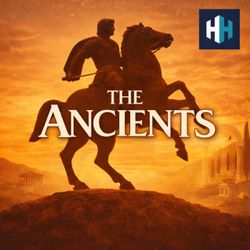
632. The Invasion of Persia | Alexander the Great
01:04:55||Ep. 632In spring 334 BC, a young Macedonian king sets out to conquer the Persian Empire.Tristan Hughes and Dr Adrian Goldsworthy explore Alexander the Great’s early campaigns, from the daring crossing into Asia to incredible victories. They discuss Alexander's strategic genius, respect toward Persian royalty, and how these triumphs forged his path to legend.MOREThe PersiansListen on AppleKing MidasListen on AppleListen on SpotifyPresented by Tristan Hughes. Audio editor is Aidan Lonergan, the producer is Joseph Knight. The senior producer is Anne-Marie Luff.All music courtesy of Epidemic SoundsThe Ancients is a History Hit podcast.Sign up to History Hit for hundreds of hours of original documentaries, with a new release every week. Sign up at https://www.historyhit.com/subscribe. You can take part in our listener survey here: https://insights.historyhit.com/history-hit-podcast-always-on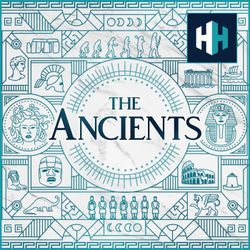
631. How to Write Cuneiform with Dr. Irving Finkel
01:00:21||Ep. 631More than 5,000 years ago, a revolutionary script emerged in the fertile lands of Mesopotamia that would transform how people counted, governed, worshipped and told stories. This was cuneiform, the world’s earliest known writing system.In this episode of The Ancients, Tristan Hughes is joined by Dr Irving Finkel to uncover how cuneiform actually worked and how you would write it yourself. From humble beginnings as simple pictograms tracking beer and grain, to the wedge-shaped signs that recorded myths, laws and epic tales long before the Bible, this episode explores how cuneiform spread across Sumer, Babylon, Assyria and Persia — and why these clay tablets remain one of archaeology’s richest windows into the ancient world.MORENoah's Ark and the FloodListen on AppleListen on Spotify The World's Oldest LettersListen on AppleListen on Spotify Watch this episode on our NEW YouTube channel: @TheAncientsPodcastPresented by Tristan Hughes. Audio editor is Aidan Lonergan. The producer is Joseph Knight. The senior producer is Anne-Marie Luff.All music courtesy of Epidemic SoundsThe Ancients is a History Hit podcast.Sign up to History Hit for hundreds of hours of original documentaries, with a new release every week. Sign up at https://www.historyhit.com/subscribe. You can take part in our listener survey here:https://insights.historyhit.com/history-hit-podcast-always-on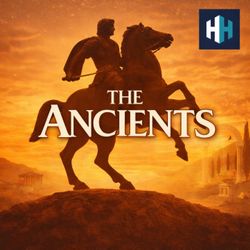
630. Alexander the Great | Rise to Power
01:24:13||Ep. 630NEW SERIES! Journey through the early life of Alexander the Great, from his education under Aristotle to his first military experiences and rise to Macedonian kingship.In this first episode, charting Alexander's incredible early life, Tristan Hughes and Dr Adrian Goldsworthy explore Alexander's formative years, the Battles that built the world's most formidable military leader and the immediate challenges following his father's assassination.MOREThe Rise of Hannibal with Adrian GoldsworthyListen on AppleListen on SpotifyDarius the Great, Persian King of KingsListen on AppleListen on SpotifyPresented by Tristan Hughes. Audio editor is Aidan Lonergan and the producer is Joseph Knight. The senior producer is Anne-Marie Luff.All music courtesy of Epidemic SoundsThe Ancients is a History Hit podcast.Sign up to History Hit for hundreds of hours of original documentaries, with a new release every week. Sign up at https://www.historyhit.com/subscribe. You can take part in our listener survey here: https://insights.historyhit.com/history-hit-podcast-always-on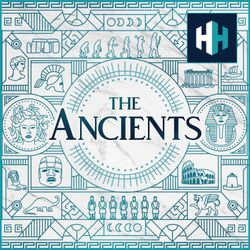
629. Adam and Eve
59:05||Ep. 629Adam and Eve: parents of humanity, or characters in a Near Eastern myth about wisdom, mortality, and the limits of being human?Tristan Hughes and Dr Dylan Johnson strip away the Sunday school varnish to re-examine the story of Adam and Eve, starting with the question: was there really an apple? They discuss the origins and multiple layers of the story, try and pinpoint where Eden might have been located, and trace the tale of lost immortality that echoes through the legends of Gilgamesh, Sumerian rivers, and the earliest biblical textsMOREMoses & The ExodusListen on Apple Listen on SpotifyThe Ark of The CovenantListen on Apple Listen on SpotifyWatch this episode on our NEW YouTube channel: @TheAncientsPodcastPresented by Tristan Hughes. Audio editor is Aidan Lonergan. The producer is Joseph Knight. The senior producer is Anne-Marie Luff.All music courtesy of Epidemic SoundsThe Ancients is a History Hit podcast.Sign up to History Hit for hundreds of hours of original documentaries, with a new release every week. Sign up at https://www.historyhit.com/subscribe. You can take part in our listener survey here:https://insights.historyhit.com/history-hit-podcast-always-on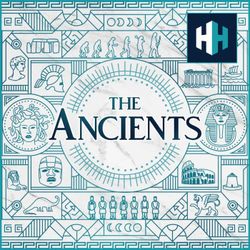
628. The First Popes
56:09||Ep. 628What do we know about the earliest Popes, and how did they shape the early Christian Church amidst persecution?Tristan Hughes is joined by Professor Rosamond McKitterick to journey back to Imperial Rome to uncover the fascinating tales of the earliest Popes, focusing on St. Peter and his possible connection to Mark's gospel, Sylvester I during Constantine's reign, and Pope Leo I who confronted Atilla the Hun.MOREJesus of NazarethListen on AppleListen on SpotifyThe Apocryphal GospelsListen on AppleListen on SpotifyPresented by Tristan Hughes. Audio editor is Aidan Lonergan and the producer is Joseph Knight. The senior producer is Anne-Marie Luff.All music courtesy of Epidemic SoundsThe Ancients is a History Hit podcast.Sign up to History Hit for hundreds of hours of original documentaries, with a new release every week. Sign up at https://www.historyhit.com/subscribe. You can take part in our listener survey here: https://insights.historyhit.com/history-hit-podcast-always-onAudio for Uploader: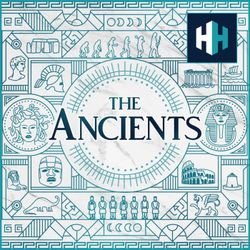
627. Xerxes the Great
55:39||Ep. 627He is one of the most famous rulers of the ancient world, remembered for leading a vast Persian invasion of Greece. Yet Xerxes the Great was far more than just a battlefield king.In this episode of The Ancients, Tristan Hughes is joined by friend of the show Professor Lloyd Llewellyn-Jones to explore the life and reign of the Persias most revered king who ruled the largest empire the world had yet seen. From his royal upbringing and court politics to religion, monumental building projects and imperial power, this episode goes beyond Greek battle narratives to uncover who Xerxes really was — and how the Achaemenid empire functioned at the height of his power.MOREDarius the Great: Persian King of KingsListen on AppleListen on SpotifyThe Persian Wars: Xerxes, Thermopylae and SalamisListen on AppleListen on SpotifyWatch this episode on our NEW YouTube channel: @TheAncientsPodcastPresented by Tristan Hughes. Audio editor is Aidan Lonergan. The producer is Joseph Knight. The senior producer is Anne-Marie Luff.All music courtesy of Epidemic SoundsThe Ancients is a History Hit podcast.Sign up to History Hit for hundreds of hours of original documentaries, with a new release every week. Sign up at https://www.historyhit.com/subscribe. You can take part in our listener survey here:https://insights.historyhit.com/history-hit-podcast-always-on